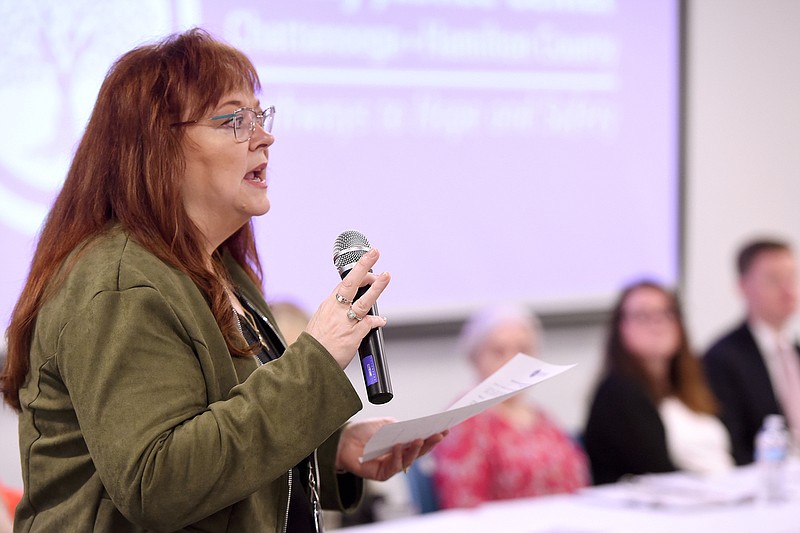Officials representing local law enforcement, the court system, health care and other social services talked Friday about what Hamilton County agencies are doing well and where they need to improve their attempts to reduce domestic violence.
"I would love to eliminate it," Regina McDevitt, executive director of the Chattanooga-Hamilton County Family Justice Center, said Friday at the center. "But we've got to have everybody at the table to do that."
Here are a few key takeaways from the speakers on Friday's panel.
1. Domestic violence is a cycle.
In many cases, people committing acts of domestic violence experienced or saw it themselves earlier in their lives, officials said.
"Your abusers, a lot of them grow up in a house of abuse," Sgt. Rodger Brown, with the Hamilton County Sheriff's Office, said during the panel. "They see it, they think it's normal, they get married, they do it all over again."
That means correctional facilities need to address a defendant's current behavior as well as their past abuse, Rebecca Harvey, district director for the Tennessee Department of Correction, said Friday.
2. The court system is intimidating for victims.
Taking a domestic violence case to court can be a frustrating, often yearslong process, panel participants said.
That can lead to "court fatigue," General Sessions Judge Christie Sell said Friday. Delayed hearings or dismissed cases take away from the sense of urgency in the case, Sell said, and sometimes a victim just wants the whole thing to go away.
"It's terrifying for these people," Brown said. "I've had them, back in the waiting area, they're just shaking like a leaf on a tree because they don't know what they're fixing to go into."
Victim advocates can make a big difference in court cases, Sell said Friday, by helping victims understand what's going on in their case.
3. Prosecutors are trying to get creative.
Kevin Loper, a prosecutor in the Hamilton County District Attorney's Office, said the office is ramping up the number of domestic violence cases it takes on. In 2019, he said, the office tried around nine domestic violence cases a year. Now, he said, nine are being tried in the first three months of the year.
But it can be difficult to prosecute when a victim doesn't want to participate or has been pressured not to cooperate with an investigation, Loper said. The office listens to calls from the county jail to see if there's any intimidation taking place, Loper said.
"Sometimes, you know, defendants are encouraging people to not come to court," Loper said. "If you come across that, you can use that in prosecution."
The DA's office also worked with state Sen. Bo Watson, R-Hixson, and state Rep. Patsy Hazlewood, R-Signal Mountain, to draft a bill this year that would make a third conviction for domestic assault a felony offense. Domestic assault is a misdemeanor in Tennessee.
That bill is still moving through the state Senate and House.
4. Law enforcement agencies need to communicate more.
In more than 80% of domestic violence homicides, either the victim or defendant interacted with law enforcement, health care or social services in the year prior, McDevitt said. That means there should be opportunities to intervene.
A recent domestic homicide-suicide in Chattanooga, for example, should be examined to see if there were earlier signs of abuse, Charlotte Boatwright, a founding member of the precursor to the Family Justice Center, said Friday.
The Chattanooga Police Department started doing lethality assessments around 2017, asking victims of domestic violence questions that give officers an idea of how much danger they may be in at home, Maj. Jason Lewis said.
They can then refer people to other services if needed, Lewis said, though waitlists can be long for immediate needs like shelter.
"We take them to jail or whatever and we're done, we move onto the next one," Lewis said during Friday's discussion. "We don't have time or the luxury of time to hang around and comfort victims."
(READ MORE: Chattanooga, Hamilton County officials mark Domestic Violence Awareness Month)
Nicole Benjamin, with Legal Aid of East Tennessee, said many times victims are told only to file protective orders, when that's not always the best option. A divorce or referral to an agency like the Department of Children's Services can sometimes help victims more, she said.
For defendants with prior convictions, local probation and parole offices aren't always notified of new charges or domestic violence incidents, according to Harvey with the correction department.
5. Domestic violence services have come a long way.
Boatwright said almost none of the services available to victims today were around when the center began in the 1990s. Health care patients were rarely screened for domestic violence concerns, Boatwright, a nurse, said.
"And wow, what a huge step forward," Boatwright said during the panel.
Kimberly Colen, a client services supervisor with the Family Justice Center, said the center used to only help victims plan to leave a partner if they were planning to leave immediately.
Now, the center can take a longer approach, considering factors like whether a victim is pregnant or has children or pets, Colen said.
"The safety plan has become much more in depth and much more individualized," Colen said Friday. "We're meeting the client wherever they're at."
Contact Ellen Gerst at egerst@timesfreepress.com or 423-757-6319.

